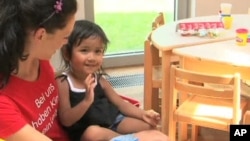Although it is preventable, each year some 400,000 infants acquire HIV from their mothers. The World Health Organization, or WHO, has released new recommendations urging all HIV positive women to receive antiretroviral drugs to protect against transmitting the virus during pregnancy, delivery or breast-feeding.
Pregnant women who are HIV positive risk passing the virus that causes AIDS to their babies. But with early and effective treatment, experts say that risk is greatly diminished.
First, mothers need to know their HIV status, so they can receive treatment, if necessary, with antiretroviral drugs.
Their babies also need to be tested early. UNAIDS prevention advisor Karusa Kiragu says that should happen within six weeks of birth.
"If a child who has HIV is not put on treatment right away, half of them will be dead by the age of two,” Kiragu said. “So it is very, very important that children born of HIV mothers – even if it's not clear they are positive or negative – it's very clear that they be tested. Once the test is confirmed, it is very important the child is put on treatment right away."
Previously, HIV positive mothers were advised against breast feeding because they can pass the virus through their breast milk. But the WHO's new guidelines say it is safe for mothers to breast feed as long as they are on HIV medications.
"Yes, they breast feed until six months of age. That is the guideline today because if they don't breast feed, it is a risk that the child dies of other diseases like diarrhea or lung infection," said Ann Akesson, the medical coordinator for Doctors Without Borders in Malawi.
Mother-to-child HIV transmission has been virtually eliminated in developed countries. But in sub-Saharan Africa, it still remains a serious problem.
Kiragu says that without intervention, there is a 45 percent chance that a baby there will be infected by its mother. She attributes the high rate, in part, to the lack of adequate health services.
"So say, for example, if women need the ante-natal care, they may not be able to go for ante-natal care,” said Kiragu. “If they need the treatment to prevent infection, they may not know about it; they may not go to get it. If they go to get it, they may not find it. So ultimately the child can become infected," she said.
But with the right precautions, the baby of an HIV positive mother can be born infection free. Dr. Akesson says that in her clinic in Thyolo, one of the most rewarding parts of her work is when she can tell a mother her baby is healthy.
"Because the mothers who have taken the prophylactics, the medication, most of the children are actually not infected and that is really wonderful to give that message to the mother," Akesson added.
The experts say protecting mothers and children from HIV is a family affair. It requires everyone knowing his or her HIV status, following safe sex practices and getting early and effective treatment.`














